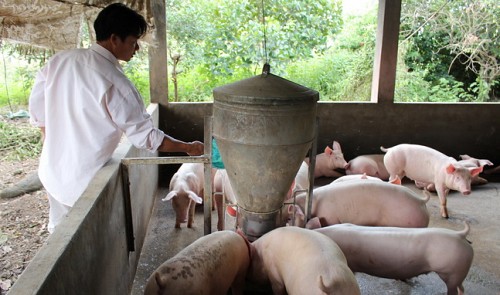Anxious cattle breeders in Vietnam must choose safe fodder brands for their herds, as a new law heavily punishing those that use banned chemicals will come into effect this July.
For the past month, Duong Thi Hoa, a cattle breeder in Dong Nai Province, has stopped mixing her own pig food from such ingredients as corn, soy beans, and premixes, which are a blend of various raw materials and additives that contain vitamins, minerals, antibiotics, and other essential ingredients.
Instead, Hoa is shifting toward buying ready-to-eat pig food from a local manufacturer.
“It costs me over VND1,000 [US$0.04] more for each kilo of pig food, but I feel safer this way,” Hoa said. “I’ll have it this way for now, rather than risk buying ingredients on the market that may contain banned chemicals.”
Hoa’s worries are understandable, as a revised law that will come into effect on July 1 this year states that those who that feed their cattle banned chemicals can face to up to 20 years in prison.
According to Hoa, some households in her area were fined at the beginning of March, after excessive amounts of salbutamol, a banned chemical that boosts the growth and production of meat in cattle, were found in their pigs’ urine.
Many other breeders like Hoa herself have grown wary of the hundreds of animal food brands currently circulating on the market, for fear of mistakenly buying chemically contaminated food.
Tran Quang Trung, owner of a farm of over 3,000 pigs in Dong Nai Province, said there was no way a regular breeder could know which brand put banned substances into their food, when all brands advertise their products as clean and of good quality.
“I only buy products by long-established manufacturers, because they use a qualified production process and have their reputation to lose if they do something illegal,” Trung explain.
Nguyen Kim Doan, vice chairman of the Dong Nai Animal Husbandry Association, said the Association has advised local breeders to be careful when picking their fodder brand, and keep the proof of purchase to protect themselves on legal terms.
“Pigs are currently sold at a high price while the price of fodder is dropping, so breeders are getting stricter on choosing cattle food in order to maximize their profit without putting themselves at risk of breaking the law,” Doan said.
As a move to assure customers of the quality of their products, many fodder brands are now offering proofs and making solemn pledges.
Late last month, Tran Minh Tien, sales director at VH Company in Dong Nai, brought his company’s fodder in for a test to prove that the food contained no banned substances.
“Customers are anxious about banned substances in animal food, so we had to take the initiative to prove that we build our business on the basis of prestige and quality,” Tien said.
Similarly, Lee Meng Hong, director of research and development at Anco and Proconco cattle food companies, said they had started printing “no banned substances” stamps to be stuck on their products as a proof of quality.
According to Lee, apart from regular quality standard inspections, his brands also send samples of their fodders to an independent testing center appointed by the Ministry of Agriculture and Rural Development to monitor the levels of beta-agonists such as salbutamol, ractopamine, and clenbuterol.
“One hundred percent of the hundreds of samples of our products have tested negative for beta-agonists. This practice will continue to ensure that no banned substances are present in our fodders,” Lee stressed.
Meanwhile, Dr. Duong Nguyen Khang, director at the Center for Research and Transfer of Technology under Nong Lam (Agriculture-Forestry) University, advised breeders to turn to technical methods to increase the productivity of their cattle.
Khang said the quickest way to do this was to import foreign breeds and crossbreed them with domestic ones and create high quality breeds that adapt well to Vietnam’s climate.

























































